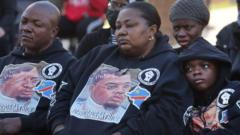The ruling has intensified scrutiny on Boeing's safety practices and resulted in uncertainty regarding future legal outcomes for the aerospace giant.
Boeing's Plea Agreement Rejected: Court Demands Greater Accountability

Boeing's Plea Agreement Rejected: Court Demands Greater Accountability
A US judge has rejected a plea deal between Boeing and the Department of Justice concerning crashes of its 737 Max planes, questioning the agreement's accountability measures.
Boeing's attempt to settle legal ramifications from two fatal 737 Max crashes was thwarted on Thursday when US District Judge Reed O'Connor rejected a plea deal that included a guilty plea to a count of criminal fraud and a $243 million fine. The judge expressed concerns that the arrangement provided inadequate oversight and failed to properly hold the company accountable for the tragedies that claimed 346 lives.
Originally agreed upon in July, the deal prompted backlash from victims' families, who labeled it a "sweetheart" arrangement. Judge O'Connor criticized the proposed monitoring system's diversity and inclusion requirements, expressing that they could undermine the selection process's integrity. He noted the government's prior oversight attempts had not succeeded, saying, "the public interest requires the Court to step in." Consequently, he indicated that Boeing's involvement in selecting the monitor was inappropriate, lacking necessary responsiveness to the monitor's recommendations.
Families of victims have long demanded accountability from Boeing following the catastrophic crashes that occurred in 2018 and 2019 due to issues related to the company's flight control system. Following a recent incident where a door panel blew off a Boeing plane, concerns over the company’s safety improvements have resurfaced.
Erin Appelbaum, a partner at Kreindler & Kreindler representing the victims' families, described the ruling as a significant victory, urging the Department of Justice to reconsider its leniency towards Boeing. The judge's decision opens the door for a renegotiated plea deal that more accurately reflects the severity of Boeing's actions.
In his ruling, Judge O'Connor underlined that a trustworthy monitoring process must prioritize competence over diversity efforts, aiming to restore public confidence in Boeing and the justice system's integrity. As both the government and Boeing prepare to negotiate a new agreement within the next 30 days, the case remains a focal point for discussions surrounding aviation safety and corporate responsibility.





















